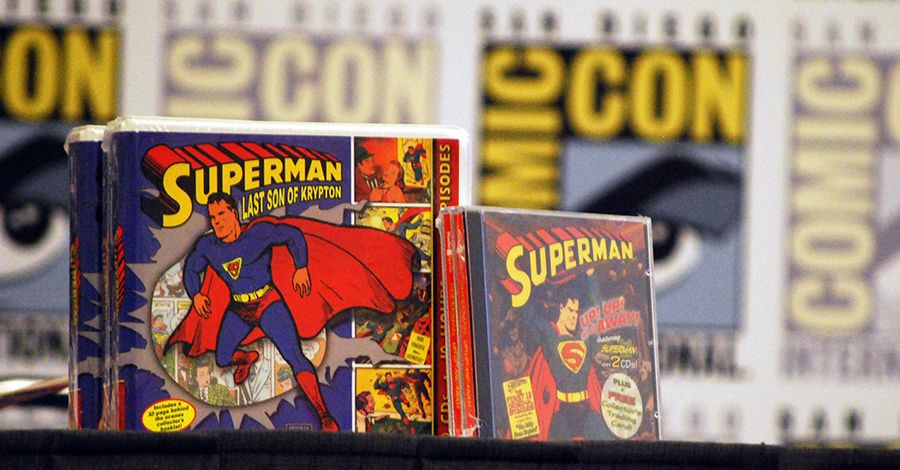Jimmy Olsen's first appearance wasn't in "Action Comics" #6. Don't believe what that comic book price guide says; the Daily Planet's favorite photographer was actually first introduced on the Superman radio show, which had its 75th anniversary celebrated during a special panel at Comic-Con International in San Diego.
Writers Mark Waid and Len Wein -- plus ex-DC Comics President Paul Levitz, who joined the panel in the final minutes -- discussed the legacy of the Superman radio show. Moderator Anthony Tollin, who researched and wrote "Smithsonian Historical Performances: Superman on Radio," started the panel by playing the radio program's iconic "faster than a speeding bullet" intro through the room's speakers.
Tollin said that the radio show's opening had defined Superman for many that grew up listening to the show. Jimmy Olsen aside, the Superman radio show also introduced Perry White, Kryptonite, and was the first medium to bring Superman and Batman together for their first team-up.
Superman made his radio debut 75 years ago today
Tollin and Waid both credited the radio show in Superman's meteoric rise in pop-culture, with Tollin adding that the Man of Steel was the first superhero to move beyond comic books; he appeared in 30 million daily newspaper strips and five million people listened to the radio show.
"There's no pop-culture precedent for this," said Waid. "If you can imagine that Superman first appeared in the summer of 1938 and by the end of 1939 and 1940, he was everywhere. In newspapers, the New York World's Fair, at Macy's doing appearances, toy stores... on radio, everywhere." Waid chalked it up to smart, calculated marketing that made the character's presence felt everywhere immediately.
Bud Collyer -- the voice of Clark Kent and Superman -- was called the "forgotten Superman" by Tollin, who noted that Collyer played The Man of Steel for a remarkable 1,500 radio episodes for almost 10 years, versus George Reeves' better-remembered television portrayal that would follow in the 1950s; that show, titled "The Adventures of Superman," lasted 104 episodes.
The panel then turned its attention to Daily Planet staffers and Superman mainstays, Editor-In-Chief Perry White and photographer Jimmy Olsen. "Ignore what it says in the comic book price guide, where some dealer saw a copyboy running in the back panel of 'Action [Comics]' #6...drawn nothing like Jimmy Olsen," said Tollin. "Jimmy Olsen was created for radio."
Behind-the-scenes trivia was dispensed throughout the panel, including that actress Rollie Bester, who played Lois Lane on the radio show, was wife of Alfred Bester, sci-fi writer and creator Green Lantern's oath.
Waid also discussed the mysterious origin of Kryptonite. In 1940, Years before it made its debut on the radio show, "Superman" co-creator Jerry Siegel sold DC a story on K-Metal -- "a remnant of Planet Krypton that zaps Superman's powers."
Superman vs. the KKK: New book sorts fact from fiction
"It was drawn and ready to go to print," said Waid. "It's a story that not only does Kryptonite first appear, but by the end of the story Superman reveals his identity to Lois Lane and they become partners in crime. I've talked to a lot of people and my general feeling is the story was rejected because... the people behind Superman were very protective of that character." Waid added that the story's publication would've have caused a major change to the status quo and the dynamic between the Clark and Lois.
The World's Finest team-up was also discussed, as the radio show was the first place Superman and Batman joined forces. Waid talked about how DC was savvy enough at the time to keep the storylines of Superman closely aligned with the comic book. "We're coming up to that point again," said Waid, mentioning how closely comic book writer and DC Comics CCO Geoff Johns works with the CW's "Flash" series.
Some historical anecdotes were also shared, including one about when the Superman radio show took a stand against the Ku Klux Klan and demonstrated how Superman did in fact stand up for "truth, justice and the American way." After an audio clip featuring a dramatic battle between Superman and the Atom Man was played, the panel talked about how the television version of Superman at the time wasn't as "super" as he was on the radio.
"But that's the beauty of radio, right?" said Waid. "It's the same as comics. Budget is not a concern."
"You have an infinite budget on radio, as you do in comics," agreed Wein.
Although some of the radio show has survived, the panel also talked about a missing swath of audio from 1941-44. "There's this two-and-a-half-year run, including the first appearance of Kryptonite, including the first Superman-Batman meeting, all of these important episodes, they're just gone forever," said Waid. The writer also talked about his personal attempt to assemble some of the old loose scripts, which he described as a "nightmare."
"It's a shame," said Waid. "Someone who loves Superman as much as I do, it kills me that there are these Superman stories that existed that are gone forever."
As the panel began to wind down, Levitz appeared and talked more about DC's early success with the licensing the character and moving Superman beyond comics and into radio and beyond. "DC, with the very rare exception, from the mid-1940s on tried to control its whole library," said Levitz. "When the X-Men movies start to succeed in the early-2000s, there were a lot of things that Marvel could have done to build the X-Men property into a world-class property, that they weren't able to do because they didn't control the X-Men cartoon... I think the DC founders were pretty good at thinking ahead," in keeping ownership over their library.



